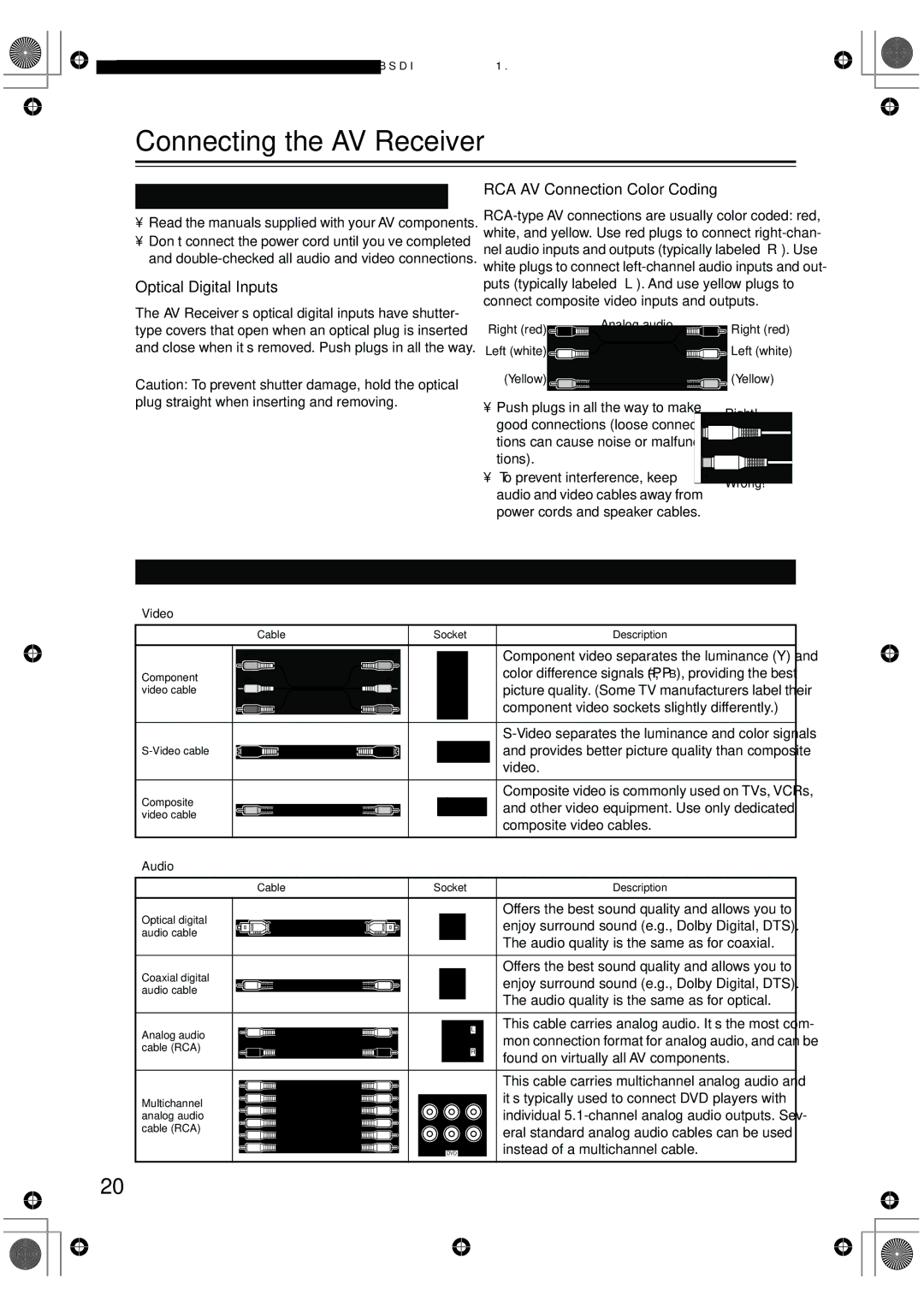
Connecting the AV Receiver
Before Making Any Connections
•Read the manuals supplied with your AV components.
•Don’t connect the power cord until you’ve completed and
Optical Digital Inputs
The AV Receiver’s optical digital inputs have shutter- type covers that open when an optical plug is inserted and close when it’s removed. Push plugs in all the way.
Caution: To prevent shutter damage, hold the optical plug straight when inserting and removing.
RCA AV Connection Color Coding
Right (red) | Analog audio | Right (red) |
| ||
Left (white) |
| Left (white) |
(Yellow) | Composite video | (Yellow) |
|
• Push plugs in all the way to make |
|
|
|
|
|
| Right! |
| ||||||||||
good connections (loose connec- |
|
|
|
|
|
|
|
|
|
|
|
|
|
|
|
|
|
|
tions can cause noise or malfunc- |
|
|
|
|
|
|
|
|
|
|
|
|
|
|
|
|
|
|
tions). |
|
|
|
|
|
|
|
|
|
|
|
|
|
|
|
|
|
|
• To prevent interference, keep |
|
|
|
|
|
| Wrong! |
| ||||||||||
|
|
|
|
|
|
| ||||||||||||
audio and video cables away from |
|
|
|
|
|
|
| |||||||||||
|
|
|
|
|
|
|
|
|
|
|
|
|
|
|
|
|
| |
power cords and speaker cables. |
|
|
|
|
|
|
|
|
|
|
|
|
|
|
|
|
|
|
AV Cables & Sockets
Video
Cable | Socket | Description |
| Y | Y | Component video separates the luminance (Y) and | |
|
| Y | color difference signals (PR, PB), providing the best | |
Component | PB | PB | ||
picture quality. (Some TV manufacturers label their | ||||
video cable |
| PB | ||
PR | PR | |||
| component video sockets slightly differently.) | |||
|
| PR | ||
|
|
| ||
| S VIDEO and provides better picture quality than composite | |||
|
|
| video. | |
Composite |
|
| Composite video is commonly used on TVs, VCRs, | |
| VIDEO | and other video equipment. Use only dedicated | ||
video cable |
|
| ||
|
| composite video cables. | ||
|
|
| ||
Audio |
|
|
| |
| Cable | Socket | Description | |
Optical digital | Offers the best sound quality and allows you to | |
OPTICAL | ||
enjoy surround sound (e.g., Dolby Digital, DTS). | ||
audio cable | ||
The audio quality is the same as for coaxial. | ||
|
Coaxial digital |
| COAXIAL | Offers the best sound quality and allows you to |
|
| enjoy surround sound (e.g., Dolby Digital, DTS). | |
audio cable |
|
| |
|
| The audio quality is the same as for optical. | |
|
|
| |
Analog audio |
| L | This cable carries analog audio. It’s the most com- |
|
| mon connection format for analog audio, and can be | |
cable (RCA) |
| R | |
| found on virtually all AV components. | ||
|
|
| |
|
|
| This cable carries multichannel analog audio and |
Multichannel | FRONT | SURR CENTER | it’s typically used to connect DVD players with |
| L | individual | |
analog audio |
|
| |
cable (RCA) |
|
| eral standard analog audio cables can be used |
|
| R | |
|
| instead of a multichannel cable. | |
|
| SUB | |
|
| DVD | |
|
| WOOFER |
|
20
